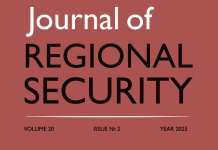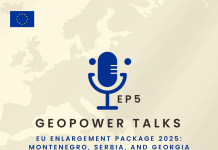The third General Assembly and consortium meeting of the scientific research project “GEO-POWER-EU: Empowering the Geopolitical EU in the Eastern Neighbourhood and the Western Balkans” was held at the Institute for Philosophy and Social Theory at the University of Belgrade on 27 May 2025.
The meeting was opened by Prof. dr Filip Ejdus from the Faculty of Political Science at the University of Belgrade and the project coordinator Prof. dr Nikolaos Tzifakis from the University of the Peloponnese.
The participants discussed important topics including the European Union (EU) enlargement and the Eastern Partnership, economic convergence and brain drain, green transition, energy security and energy poverty. The meeting also covered geopolitical competition and the EU’s strategic autonomy, a comprehensive and multidimensional policy framework, media disinformation in the Western Balkans and Eastern partner countries, dissemination, communication and exploitation, project management and academic coordination, as well as financial management of the project.
Following the topic presentations, participants discussed the next steps of the scientific research project. Time was also allocated for interactive strategic thinking, brainstorming, and networking.
The goal of the “GEO-POWER-EU: Empowering the Geopolitical EU in the Eastern Neighbourhood and the Western Balkans” project is to contribute to strengthening the EU’s capacity to manage security threats in an increasingly challenging geopolitical environment in the Eastern Neighbourhood and the Western Balkans region.
The purpose of the project is to formulate a proposal for a comprehensive EU strategy toward these regions. This strategy is expected to utilize new and reformed policy tools and instruments, taking into account forecasts concerning the strategic ambitions of other geopolitical actors.
The project coordinator is the University of the Peloponnese. In addition to the Faculty of Political Science at the University of Belgrade, project partners include: the University of Bologna, the University of Rijeka, the Vienna Institute for International Economic Studies, the South-East European Research Centre (Greece), the European Neighborhood Council (Belgium), the Academy for Applied Arts at the University of Rijeka, the Institute for Democracy Societas Civilis Skopje (North Macedonia), VE-Insight (Austria), the Democratization Policy Council (Germany), the Institute for Development and Social Initiatives “Viitorul” (Moldova), Odesa Mechnikov National University (Ukraine), the Georgian Foundation for Strategic and International Studies, and the Swedish Institute of International Affairs.
The research team from the Faculty of Political Science includes Prof. dr Filip Ejdus, Prof. dr Nemanja Džuverović, Assistant Professor dr Marko Kovačević, Teaching Assistant Dr Tijana Rečević Krstić, and Researcher MA Milan Varda.
The “GEO-POWER-EU: Empowering the Geopolitical EU in the Eastern Neighbourhood and the Western Balkans” project is being implemented within the EU’s Horizon 2020 research and innovation funding program.




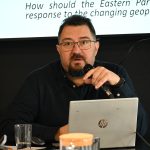
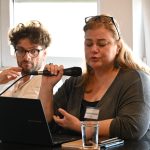

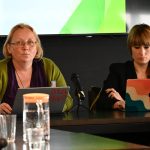












For the report on this meeting in Serbian, see the news published at the University of Belgrade, Faculty of Political Science. Photo credits: Faculty of Political Science.
Related news:
GEO-POWER-EU Holds 2nd Consortium Meeting in Belgrade
GEO-POWER-EU & REUNIR Host Conference on the EU’s Role in the Western Balkans and the Eastern Partnership




